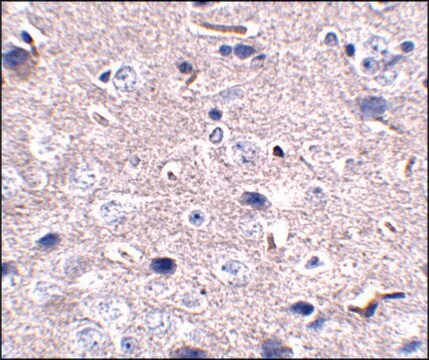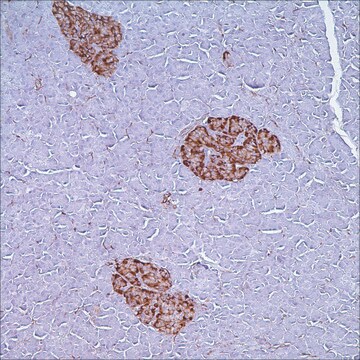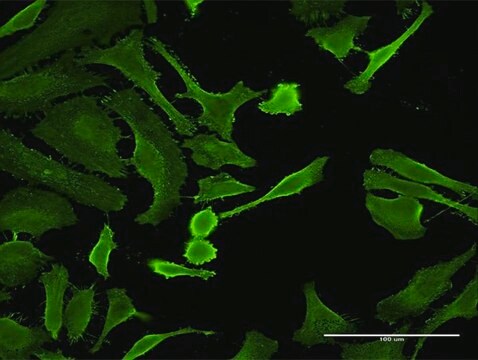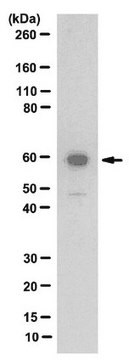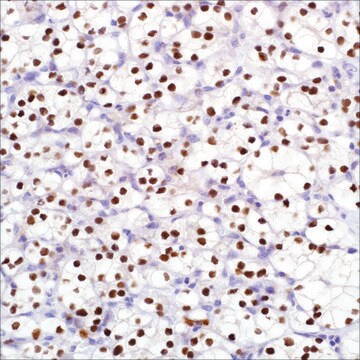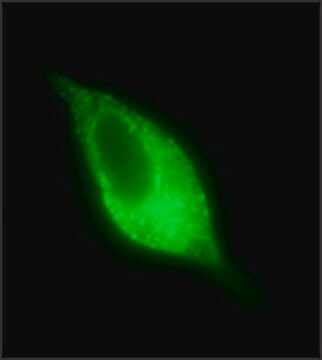推薦產品
生物源
mouse
品質等級
共軛
unconjugated
抗體表格
purified immunoglobulin
抗體產品種類
primary antibodies
無性繁殖
AS32, monoclonal
形狀
buffered aqueous solution
物種活性
human
濃度
~1 mg/mL
技術
neutralization: suitable
western blot: suitable
同型
IgG1
UniProt登錄號
運輸包裝
wet ice
儲存溫度
2-8°C
目標翻譯後修改
unmodified
基因資訊
human ... CTLA4(1493)
一般說明
CD152 is structurally similar to CD28 and is a member of the immunoglobin (Ig) gene superfamily. The gene encoding human CD152 is present on chromosone 2. It is composed of a single Ig V-like extracellular domain, a transmembrnne domain, and an intracellular domain. It is mainly expressed by cytotoxic T lymphocytes and the level of expression is activation-dependent.
免疫原
recombinant extracellular domain of human CD152.
應用
Monoclonal Anti-CD152 antibody produced in mouse is suitable for western blotting and for neutralization studies, where this antibody has been shown to block the interaction of soluble human CD152 with human CD80.
生化/生理作用
CD152 and CD28 together with their ligands constitute one of the dominant co-stimulatory pathways that regulate T- and B-cell responses. CD152 acts as a co-stimulatory molecule in eliciting T cell help during antigen presentation and functions as a negative regulator of T cell activation.
標靶描述
CD152, a cell surface glycoprotein, is one of two ligands (the other is CD28) for CD80 (B7-1) and CD86 (B7-2). This interaction appears to function as a negative regulator to T cell activation. CD152 is transiently expressed on activated T cells.
外觀
Solution in 0.01 M phosphate buffered saline, pH 7.4, containing 0.08% sodium azide.
準備報告
Prepared from tissue culture supernatant, purified using protein G.
免責聲明
Unless otherwise stated in our catalog or other company documentation accompanying the product(s), our products are intended for research use only and are not to be used for any other purpose, which includes but is not limited to, unauthorized commercial uses, in vitro diagnostic uses, ex vivo or in vivo therapeutic uses or any type of consumption or application to humans or animals.
未找到適合的產品?
試用我們的產品選擇工具.
儲存類別代碼
10 - Combustible liquids
水污染物質分類(WGK)
WGK 2
閃點(°F)
Not applicable
閃點(°C)
Not applicable
分析證明 (COA)
輸入產品批次/批號來搜索 分析證明 (COA)。在產品’s標籤上找到批次和批號,寫有 ‘Lot’或‘Batch’.。
Yasuhiro Shimojima et al.
Modern rheumatology, 27(1), 102-109 (2016-05-05)
We investigated the characteristics of circulating T-helper (Th) cells and CD4 Peripheral blood samples were obtained from 14 patients with PAN. Nine patients having granulomatosis with polyangiitis (GPA) and 11 healthy individuals (HC) were enrolled as controls. Th cells and
T Lindsten et al.
Journal of immunology (Baltimore, Md. : 1950), 151(7), 3489-3499 (1993-10-01)
CTLA-4 is an adhesion receptor expressed on activated T cells. The amino acid sequence of CTLA-4 is related to CD28, and although the function of CTLA-4 remains unknown, it shares several features with CD28, including a common counter-receptor, B7, that
N J Karandikar et al.
The Journal of experimental medicine, 184(2), 783-788 (1996-08-01)
CTLA-4, a CD28 homologue expressed on activated T cells, binds with high affinity to the CD28 ligands, B7-1 (CD80) and B7-2 (CD86). This study was designed to examine the role of CTLA-4 in regulating autoimmune disease. Murine relapsing-remitting experimental autoimmune
M Murakami et al.
Proceedings of the National Academy of Sciences of the United States of America, 93(15), 7838-7842 (1996-07-23)
To determine whether alternative cytotoxic T lymphocyte-associated protein 4 (CTLA4) binding proteins exist on B cells, we constructed (i) mCTLA4hIgG consisting of the extracellular region of a mouse CTLA4 molecule and the Fc portion of a human IgG1 molecule and
Danbee Ha et al.
Proceedings of the National Academy of Sciences of the United States of America, 116(2), 609-618 (2018-12-28)
Anti-CTLA-4 mAb is efficacious in enhancing tumor immunity in humans. CTLA-4 is expressed by conventional T cells upon activation and by naturally occurring FOXP3+CD4+ Treg cells constitutively, raising a question of how anti-CTLA-4 mAb can differentially control these functionally opposing
我們的科學家團隊在所有研究領域都有豐富的經驗,包括生命科學、材料科學、化學合成、色譜、分析等.
聯絡技術服務